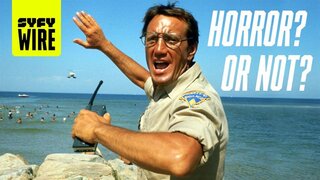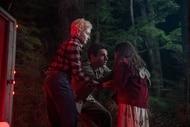A Deep Dive into the Weird World of the Jaws Sequels
Jaws sequels were inevitable. Watching them getting this weird probably wasn't.
Steven Spielberg's Jaws (now streaming on Peacock) was, and is, a cinematic landmark, a moment that ushered in blockbuster filmmaking like no production before it. Looking back, it's easy to see why. Even apart from the premise, the poster, and the sheer mass appeal of it, it's a movie that's just... well, almost perfect. It's lightning in a bottle, and its success meant that sequels were probably inevitable.
What wasn't inevitable, of course, was the sequels getting quite so strange.
In the 12 years following the release of Jaws, we got three new movies following killer sharks and various members of the Brody family. They hopped locations, changed premises, and in one case completely ignored some of what came before. They all sought to capture the particular magic of Spielberg's original film, and while they never quite made it, they remain a fascinating time capsule of franchise filmmaking in the days before absolutely everything was a franchise.
So, since it's summer, and you're probably already watching Jaws anyway, let's take a closer look at this strange, sometimes baffling trio of films.
The Long Strange Trip of the Jaws Sequels
Jaws 2 (1978)
The first Jaws sequel is, not surprisingly, the most straightforward follow-up to the original. It follows Police Chief Martin Brody (Roy Scheider) as another shark menaces Amity Island and its residents and tourists, all while the town is trying to promote tourism through the opening of a brand-new Holiday Inn. Naturally, this means city officials don't take kindly to Brody raising the alarm about a new threat in the water, even as it's clear the chief is unraveling and probably suffering from PTSD thanks to what came before.
As with Jaws, you've got the push-pull between the police chief and the local bigwigs who'd rather sweep danger under the rug, but you've also got some other key elements. The film does its best to juggle two major narratives, one being Brody's paranoid descent into old fears, the other being local teenagers like Brody's son Mike (Mark Gruner) just wanting to have a good time out on the water, unaware of the danger. Both of these narratives are promising, and the film's great weakness is its struggle to balance between them. Director Jeannot Szwarc does a fine job, even playing on certain visual motifs evident in the original film, but the economy of storytelling and the depth of Spielberg's field of view just aren't there, and that means that the film feels unbalanced and often overstuffed. It's a competent movie, but certainly a step down from Jaws.
That said, it does have what's arguably the most over-the-top and amazing shark death scene in the series.
Jaws 3 (1983)
There was a point where the Jaws sequels might possibly have gone a different direction, following new characters and new settings while keeping the killer shark motif in place. It might have worked, but we'll never know, because for Jaws 3, filmmakers decided it was best to stick with members of the Brody family, and that would remain the case for the rest of the franchise's history.
The good news with Jaws 3 (my personal favorite of the sequels) is that the filmmakers did decide to move the show, taking the action from New England to Florida, and specifically to a state-of-the-art new SeaWorld attraction that includes underwater observation tunnels. It's here that a now-adult Mike Brody (Dennis Quaid) has landed to work with sea life, but unfortunately for him, a great white shark just happens to swim into town right as his water-averse little brother Sean (John Putch) is visiting. Together, the Brody sons have to follow in their father's footsteps to vanquish a killer in the ocean.
Jaws 3 is, to its credit, a rather pronounced departure from the events of Jaws and Jaws 2. Those are more intimate, tightly controlled films, while Joe Alves' third installment is built on spectacle. It's set in a theme park full of stunt water skiers, orcas, dolphins, hula dancers, and more, so everywhere you look something interesting is theoretically happening. Its major setpieces unfold not on the open ocean, but in a vast underwater complex of tunnels and pumps and gates, and in one memorable and genuinely frightening moment, tourists are not fleeing the beaches to escape a shark, but trapped in a flooding tunnel system while they wait for help to arrive. It's all a bit grander in scope than the first two films, which certainly doesn't make it better, but does it make it very interesting, even if the 3-D effects of the era stand out as glaringly odd camera placements now.
Jaws: The Revenge (1987)
Mostly famous these days for being considered one of the strangest sequels ever, Jaws: The Revenge ignores Jaws 3 and decides instead to tell a new story of the older Brody family after Martin has died of a heart attack. After a shark attack claims the life of her youngest son in Amity, Ellen Brody (Lorraine Gary) decamps to The Bahamas to be with Mike (Lance Guest), now a marine biologist who assures her that great white sharks don't come down to the warm waters of the Caribbean. Ellen, convinced that the great white that killed her son is out take vengeance on her whole family, isn't so sure about the move, but soon falls for a dashing local pilot (Michael Caine) and seems to forget her fears... until they come back to the surface.
This is the most convoluted of the Jaws sequels, which is really saying something considering everything that went into Jaws 3, and it suffers for it. The film spends way too much time trying to cement Ellen Brody's fears and making the necessary moves in location, pushing the story to accommodate the Brody family rather than just telling a new tale with new characters. That means that huge swaths of the movie pass without even the mention of a shark in the water, and by the time the shark effects do kick back in, it all feels rushed. Then, of course, there's the weird, overwrought storytelling, the strange reliance on flashbacks that don't quite make sense, and of course, you know, the idea that a shark that wasn't even there in 1975 is now out for revenge. It's a movie that can't decide whether it wants to be campy or sincere, and that means it has a hard time really hooking us either way. Still, if you're one of those movie anthropologists who wants to see how this film got its reputation, it's worth checking out.
All four Jaws films are now streaming on Peacock.










































